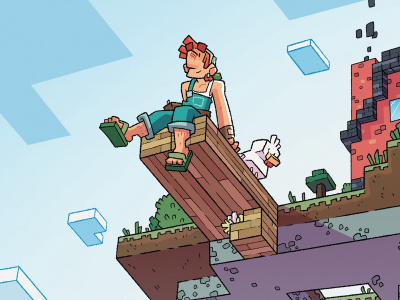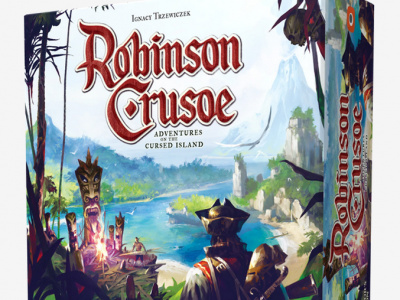Sharpening the Sword is a regular column by retailer John Riley of Grasshopper's Comics, a 1300 square foot comic and games store in
The last ICv2 Guide to Games had an interview with some of the top names in the industry, including Peter Adkison, Greg Goldstein and others. The interview ran through a number of important topics looking at the future of hobby gaming from the point of view of some of the people who not only created large elements of the genre, but are currently responsible for running them. Of the questions asked though, the one that caused me to really take notice was about the future of hobby gaming stores in a world that is increasingly either moving online, or has integral online components.
Across the board, the answers seemed to all involve a common theme, that of Organized Play. Here are parts of the responses:
Adkison: 'I think that [organized play] is one model that is still very effective in the gaming culture. Stores that will specialize and create an organized play environment -- like booster drafts and sealed deck events because players have to make a purchase. So you have to create a community and you have to have a way to sell in decent volumes.'
Buehler: 'What's the reason for them to go back to the hobby stores? It's these social gaming experiences. They can get the product, they're already online, but I fully expect to be able to get them to experience the culture in person because there are events to drive them, and there are experiences for them to have, and there is a social element...'
Goldstein: 'We want to use this test store [UDE is building a company owned retail store] to create environments in which gamers want to be. That will be something along the lines of traditional organized play, something along the lines of being able to make purchases and play on the spot, but also trying different types of activities and entertainment-related events to bring consumers, both current and new, into the environment.'
After talking with many retailers throughout the country it's clear that Organized Play, and the 'Event Center' model of games retailing, is not only an important element in the success of many stores, but growing more important each year. As we face ever increasing competition from Internet discounters it just makes sense to concentrate our efforts on exploiting our greatest strength: our ability to create a social community. Running regular events creates an exciting environment, introduces new players to our hobbies, and provides existing players with more opportunities to engage in their hobbies.
In order to fully take advantage of this social gaming element, stores designed to run large or multiple events must dedicate valuable space to in-store gaming that could otherwise be used for product. And since most stores run events during the evenings or weekends, that means dedicating space that won't be used most of the week. To run events as well as possible, these stores invest a great deal of resources in the form of space, money, employee time, and effort. But as Steve Olsen of Little Shop of Comics pointed out in his article last year (see 'Steven Olsen of A Little Shop of Comics on CCG Pre-Releases'), there are still great inequalities and a seeming lack of professionalism in the distribution of events in our industry.
We had a recent experience that highlighted how odd our system is. There was a regional event held in another store that was heavily attended by our players. In fact, our players accounted for over 70% of all players in attendance (and we had more that wouldn't make the trip). We've done a lot of work to promote this game and have created a very vibrant community for it in our store. Based on our attendance of the regional event, we contacted the manufacturer to inquire if it would be possible for us to host a regional level event in the future. Based on our long-standing history of running regular events, we felt we had demonstrated our efforts at building a community for this game.
There were a number of possible responses that I was prepared for. Perhaps there were geographic factors, or minimum space requirements, or perhaps contracts had been signed with certain venues, all of which might prevent us from being able to host in the short or long term. I was prepared to provide pictures of our store, perhaps a copy of our marketing plan, and discuss our maximum capacity, etc. But we never got that far. We were told that we could apply for an event, but it really didn't matter as we would NEVER get one...never. Apparently, another retailer had a long personal relationship with the manufacturer that regardless of our support level or qualifications relative to theirs, all important events would always go to the other store. This other store isn't in my local market and I have no ill will towards them at all, but it does illustrate that there is a lack of standardized practices when it comes to higher level events.
As part of GAMA's Mentorship Program I've spoken with quite a few prospective retailers over the past year who were interested in opening an 'event center' (in fact, I've considered it myself over the past few years). But unfortunately, each of these entrepreneurs were operating under the assumption that if they built a center large enough for major tournaments and invested in the facilities, that they would be able to host pre-release and regional level events. But to the best of my knowledge I have yet to see a major manufacturer clearly illustrate their policies on allocating special and regional level events. It's been very hard to explain to these aspiring store owners that although they might be willing to build a state of the art facility, there is every reason to believe that the regional event will continue to be held in another store's basement.
I recently asked one manufacturer to explain their methodology for deciding who got a special event. For those of you who don't know, New York takes about eleven hours to drive across, yet in this particular case the stores representing our state were mine and one twenty minutes from me, a situation which didn't seem to make any sense, and which occurred every time. Again, I'm friends with this other store, I just didn't understand why the manufacturer would have both of us compete for the same audience and ignore the rest of the state. Since we run about a hundred events annually for that company I generally expect to be considered for special events, but I was curious as to why they chose the other store that doesn't run any events for them. The answer I got was, 'There are a lot of factors, but some are random.' I pushed for some specifics, but that was all I could get. So apparently, if I hold one hundred events for them a year or zero events a year, it doesn't matter, some other factors are involved.
Like all of us, I could go on for many pages with examples like this. But they all center on the same issue: that there appear to be few, if any, published standards for deciding upon regional event locations. Before I go any further I guess I should ask, 'Why should we care?' Well, because regional events are significant money makers while the '$8 admission which includes two packs events' really aren't. It takes a whole lot of $8 admissions to make up for the guy who bought his five cases of World of Warcraft online.
Simply put: if the social gaming environment of Organized Play is the prescribed future of the hobby game store, then we need published standards from the manufacturers for stores to participate in these programs at all levels. For basic events there should be minimum requirements to participate (i.e. stores can't hold tournaments in unfinished, moldy basements, or at the owner's house). Participants can be routinely surveyed online or via email to ensure that they are receiving a good experience. And for regional level events there needs to be a level of transparency so that stores are clearly informed of the requirements for running these events and how decisions on their allocation are made.
It's time that OP stopped being a 'grassroots' program and that both retailers and manufacturers are held up to higher standards of professionalism. Only when we reach that point will retailers have the incentive to truly invest in the format, and new entrepreneurs will have justification for entering the field.
The opinions expressed in this column are solely those of the writer, and do not necessarily reflect the views of the editorial staff of ICv2.com.







